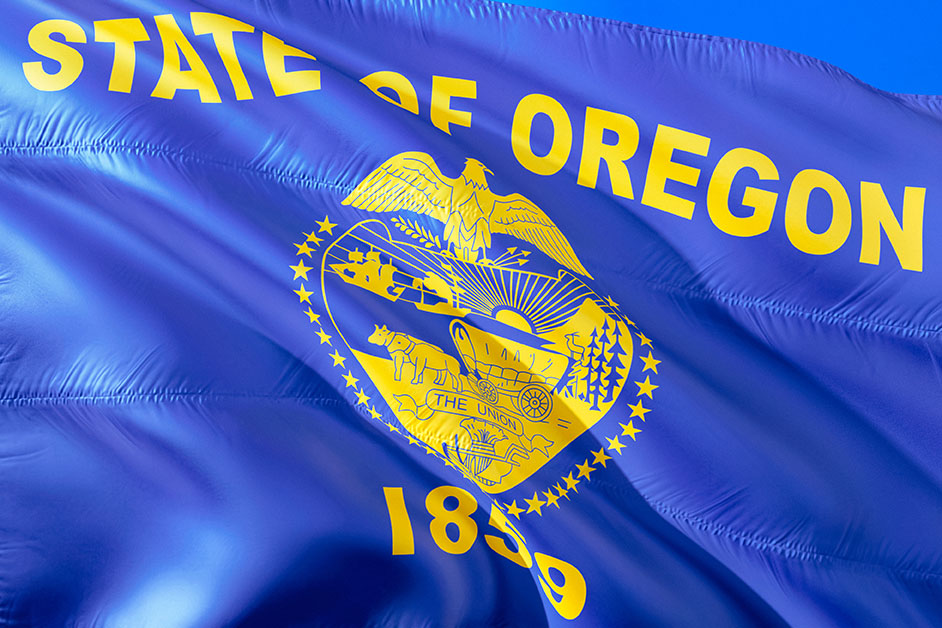
Oregon lawmakers in both legislative chambers approved an EPR proposal. | Borka Kiss / Shutterstock
This story has been updated following a House of Representatives vote on June 25.
The Oregon House of Representatives approved a bill establishing extended producer responsibility for packaging and overhauling the state’s recycling system Friday afternoon. The bill cleared the Senate earlier this week, and it now goes to the state’s governor for a signature.
Senate Bill 582 establishes a producer responsibility program for packaging, printing and writing paper, and food serviceware. The bill, which was introduced in January, has been moving through the legislative process and reached the Senate floor on June 23.
The Senate approved the bill on a 16-13 vote, which fell almost entirely on party lines, with just one Democrat voting against the proposal.
On Friday afternoon (June 25), the House of Representatives passed the bill on a 31-24 vote, also very closely along party lines. The bill will now be sent to Democratic Gov. Kate Brown for a final signature.
Before Friday’s House vote, Rep. Janeen Sollman, a Democrat and co-sponsor of SB 582, said the bill has producers paying more for materials that are harder to recycle, and less for more readily-recyclable packaging.
“Boom, an incentive to make change to produce less waste,” she said.
Generated revenue will go toward recycling system upgrades that will make Oregon’s recycling programs convenient, accessible and responsible, Sollman said.
Beyond EPR, Sollman also praised the bill for improving accessibility to recycling in rural communities and multi-family settings.
Prior to the June 23 Senate vote, bill sponsor Sen. Michael Dembrow, a Democrat, described the fluctuations in the U.S. recycling system in recent years and said they highlight the need for major changes.
The EPR discussion in Oregon, he noted, was triggered directly by China’s decision to restrict and ban certain recovered materials. That led to a recycling market crisis in Oregon, he said.
“As often happens with crises, a crisis occurs and it reveals deep flaws in our system that need to be addressed,” Dembrow said. “What we realized was just how weak our recycling system had become.”
Sen. Lee Beyer, a Democrat and chair of the Senate Committee On Energy and Environment that recommended passage of the bill, spoke to the changes it would make in Oregon’s recycling system. Producers would be responsible for a portion of the costs of recycling their products. Fees would be set by producer responsibility organizations, not by the state Department of Environmental Quality, Beyer said. The state agency will establish a statewide list of accepted materials, however, “so we don’t continue to have it in a haphazard manner,” Beyer said.
Beyer likened the EPR discussion to similar processes to establish Oregon’s 1971 container deposit legislation, which was the first in the U.S., as well as the state’s electronics recycling program, which requires producers to fund collection and recycling of certain devices. These programs generated concerns and opposition prior to passage, he noted, but both have improved recovery of their target materials.
He added that opposition to the Oregon EPR proposal is coming in part from national industry interests that are worried about EPR taking off on a wider scale in the U.S.
“Their concern is that if Oregon establishes this program, as we did with the bottle bill, it will become a national program,” he said.
But Beyer also read from the recent Ellen MacArthur Foundation statement expressing significant corporate support for EPR programs, from major retailers, brand owners and others.
Sen. Lynn Findley, a Republican and vice chair of the environment committee, expressed concerns that the bill does not address recycling market development in Oregon. He said producers were not as active in the policy development discussions as other stakeholders, and he anticipates they will pass recycling costs on to the consumer.
The Oregon legislative approval follows a similar legislative process in Maine, where both chambers of the legislature last week approved a packaging EPR program that will now move to the state’s governor for a possible signature.
More stories about EPR/stewardship
- Circular Action Alliance revises Colorado EPR plan
- PET Recycling Coalition doubles down on thermoforms
- Proposed Canadian EPR changes could inform US plans


